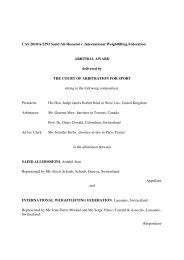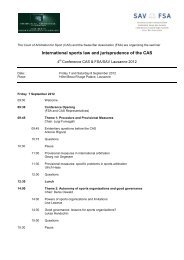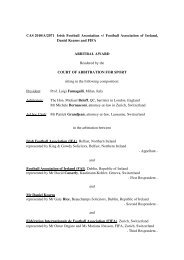(CAS) Bulletin - Tribunal Arbitral du Sport / TAS
(CAS) Bulletin - Tribunal Arbitral du Sport / TAS
(CAS) Bulletin - Tribunal Arbitral du Sport / TAS
Create successful ePaper yourself
Turn your PDF publications into a flip-book with our unique Google optimized e-Paper software.
The Respondent is of the opinion that in spite of<br />
the wording of clause 1.2 of the Agreement, the law<br />
applicable to the present dispute shall be FIFA rules<br />
and subsidiarily Swiss Law given the international<br />
dimension of the dispute, as <strong>CAS</strong> and FIFA<br />
jurisprudence so have proclaimed in other cases of<br />
this kind.<br />
In light of the above mentioned, the Panel considers<br />
that it shall resolve the present dispute in accordance<br />
with the FIFA RSTP and Swiss Law, as (i) the Claimant<br />
has expressly mentioned that for the matters involved<br />
in this dispute, such regulations are not incompatible<br />
with Ukrainian Law (which content, by the way, has<br />
not been proven in these proceedings) and (ii) the<br />
Player has not only not challenged such Claimant’s<br />
statement, but also called for the applicability of FIFA<br />
regulations and Swiss Law. It is to be mentioned that<br />
both before and at the hearing, the parties were asked<br />
and had ample opportunity to comment on Swiss<br />
Law.<br />
Therefore the present dispute will be decided<br />
according to the FIFA RSTP and Swiss Law.<br />
B. Merits<br />
1. The object of the dispute<br />
According to the parties’ written submissions and the<br />
arguments raised by them in the hearing, the object<br />
of the dispute may be briefl y summarized as follows:<br />
the Claimant considers that the Player terminated the<br />
Agreement without just cause and that therefore he<br />
shall compensate the Club for this, while the Player<br />
understands that he was entitled to terminate the<br />
Agreement with just cause, and thus intends to get<br />
an indemnifi cation from the Club as regards of such<br />
termination.<br />
2. The validity of clause 7.1 of the Agreement. The<br />
breach of the Player’s obligations. Consequences<br />
The Panel shall start the assessment of the quaestio<br />
litis by analyzing clause 7.1 of the Agreement, and<br />
specifi cally by determining (i) if it is a valid and<br />
binding clause or if as the Respondent holds, this<br />
clause is null and void, and (ii) in case the clause is<br />
deemed valid, if the Player breached the obligations<br />
contained therein.<br />
The referred clause reads as follows:<br />
“ The present Contract is valid from July 30, 2007 till June<br />
30, 2011. The Player and the Club have agreed that unless<br />
the Club sells the Player’s right <strong>du</strong>ring 2 fi rst seasons of this<br />
Contract validity, the parties shall sign new three seasons<br />
Labour contract on the same conditions valid until June 30,<br />
2012. If the player refuse to extend this Contract he shall pay<br />
to the Club the fi ne equal to the Player’s salary per 5 th season<br />
stipulated in Appendix 1 of this Contract ”.<br />
The Player has challenged the validity of this clause<br />
by basically stating that it constitutes a unilateral<br />
option only providing obligations and consequences<br />
for the Player but not for the Club.<br />
The Panel, after the corresponding checking of the<br />
mentioned clause, cannot share the Player’s view on<br />
its alleged invalidity, mainly for the following reasons:<br />
- According to the clause’s wording, in case the<br />
Player was not transferred within the fi rst two<br />
contractual seasons, both parties -and not only the<br />
Player- were bound to enter into a new contract<br />
under certain conditions previously stipulated in<br />
the Agreement (“… the parties shall sign…”). This<br />
means that both the Player and the Club could<br />
compel the counterparty to conclude the agreed<br />
extension of the Agreement. Accordingly, this<br />
cannot be considered a unilateral right of the Club.<br />
Therefore it cannot be understood that the clause<br />
was drafted in the interest or detriment of one of<br />
the parties only, but in the interest or detriment of<br />
the two of them.<br />
- The event triggering the obligation of the parties<br />
to conclude a new contract (i.e. no transfer of<br />
the Player to a third club within the fi rst two<br />
contractual seasons) also depended on both<br />
parties’ will: both the consent of the Player and<br />
of the Club would have been necessary for such a<br />
transfer of the Player.<br />
- The fact that the clause only foresees the<br />
consequences of its potential breach by the Player<br />
does not mean at all that in case it was the Club the<br />
one breaching the clause, no consequence would<br />
arise. This consequence could be well established<br />
in accordance with the applicable law to the<br />
Agreement. In fact, if the Club had breached its<br />
obligation under clause 7.1 of the Agreement the<br />
Player could have asked the enforcement of the<br />
clause, offering to the Club his working services,<br />
and claiming the salary for the whole (i.e. the<br />
extended) <strong>du</strong>ration of the employment period.<br />
Therefore the Panel understands that clause 7.1 of the<br />
Agreement is valid and binding for both parties.<br />
This being said, the Panel shall determine if the<br />
Player breached its obligations under this clause, and<br />
if it is the case, which consequences arise out of the<br />
mentioned breach.<br />
Jurisprudence majeure / Leading cases<br />
-<br />
79





